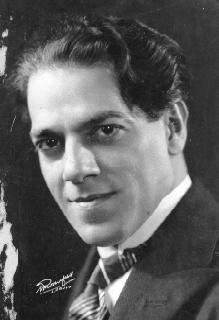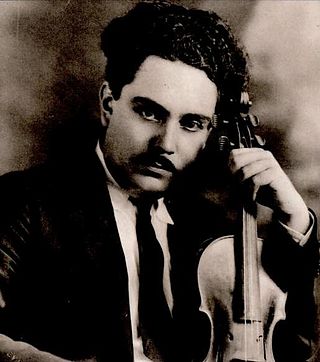
String Quartet No. 9 is part of a series of seventeen works in the medium by the Brazilian composer Heitor Villa-Lobos, and was written in 1945. A performance lasts approximately 25 minutes.

String Quartet No. 9 is part of a series of seventeen works in the medium by the Brazilian composer Heitor Villa-Lobos, and was written in 1945. A performance lasts approximately 25 minutes.
Villa-Lobos composed his Ninth Quartet in Rio de Janeiro in 1945. It was first performed in London in 1947, but the exact date, place, and performers are not known. The first performance in the composer's native country took place at the Auditório do MEC in Rio de Janeiro on 25 April 1960, as part of the Festival Villa-Lobos. The performers on this occasion were the Quarteto de Cordas da Rádio MEC. The score is dedicated to Mindinha (Arminda Neves d'Almeida), the composer's companion for the last 23 years of his life. [1]
The quartet consists of four movements:
The first movement is cast in the traditional sonata-allegro form, with a particularly strong influence from Joseph Haydn. This is seen especially in the use of mirroring that recalls the al rovescio counterpoint of the fugue in Haydn's Op. 20, No. 2. [2] The second theme group contains four subjects, the second of which uses the octatonic scale, suggesting the possible influence of Stravinsky. [3]
The second movement, on the other hand, shows remarkable similarities to Alban Berg's Lyric Suite and to Béla Bartók's Sixth Quartet. [4]
Chronological, by date of recording.

Música de feria is a composition for string quartet by the Mexican composer and violinist Silvestre Revueltas, written in 1932. Though not so titled by the composer, it is sometimes referred to as his String Quartet No. 4. A performance lasts a little more than nine minutes.

String Quartet No. 2 (Magueyes) is a chamber-music work by the Mexican composer and violinist Silvestre Revueltas from 1931. The score is dedicated to Aurora Murguía and a performance of it lasts between ten and eleven minutes.

String Quartet No. 1 is the first of seventeen works in the genre by the Brazilian composer Heitor Villa-Lobos, originally written in Nova Friburgo in 1915 and extensively revised in 1946. A performance lasts approximately eighteen minutes.

String Quartet No. 2 is the one of a series of seventeen works in the genre by the Brazilian composer Heitor Villa-Lobos, and was written in 1915. A performance lasts approximately twenty minutes.

String Quartet No. 3 is the third of seventeen works in the medium by the Brazilian composer Heitor Villa-Lobos, and was written in 1916. A performance lasts approximately twenty-three minutes.

String Quartet No. 4 is the fourth of seventeen works in the genre by the Brazilian composer Heitor Villa-Lobos, written in 1917 and revised in 1949. A performance lasts approximately 23 minutes.

String Quartet No. 5 is the fifth of seventeen works in the genre by the Brazilian composer Heitor Villa-Lobos, written in 1931. A performance lasts approximately 17 minutes.

String Quartet No. 6 ("Brazilian") is one of seventeen works in the genre by the Brazilian composer Heitor Villa-Lobos, and was written in 1938, in between his early and late periods. Villa-Lobos considered naming it "Quartet Popular No. 2" as opposed to "Brazilian," and while the work is indeed one of his more nationalist pieces, it also bears direct connections to the Viennese tradition of string quartet composition. A performance lasts approximately 24 minutes.

String Quartet No. 7 is the seventh of seventeen works in the genre by the Brazilian composer Heitor Villa-Lobos, written in 1942. With a performance lasting approximately 37 minutes, it is the longest of Villa-Lobos's string quartets

String Quartet No. 8 is one of seventeen works in the genre by the Brazilian composer Heitor Villa-Lobos, written in 1944. A performance lasts approximately twenty-five minutes.

String Quartet No. 10 is one of a series of seventeen works in the genre by the Brazilian composer Heitor Villa-Lobos, and was written in 1946. A performance lasts approximately 23 minutes.

String Quartet No. 11 is a 1947 string quartet, part of a 17-work series in the medium by Brazilian composer Heitor Villa-Lobos. A performance lasts approximately 27 minutes.

String Quartet No. 12 is the part of a series of seventeen works in the genre by the Brazilian composer Heitor Villa-Lobos, and was written in 1950. A performance lasts approximately twenty-two minutes.

String Quartet No. 13 is one of a series of seventeen works in the medium by the Brazilian composer Heitor Villa-Lobos, and was written in 1951. A performance of it lasts approximately twenty minutes.

String Quartet No. 14 is the one of a series of seventeen works in the medium by the Brazilian composer Heitor Villa-Lobos, and was written in 1953. A performance lasts approximately seventeen minutes.

String Quartet No. 15 is one of a series of seventeen works in the medium by the Brazilian composer Heitor Villa-Lobos, and was written in 1954. A performance lasts approximately nineteen minutes.

String Quartet No. 16 is the penultimate of seventeen quartets by the Brazilian composer Heitor Villa-Lobos, and was written in 1955. A performance lasts approximately twenty minutes.

String Quartet No. 17 is the last of seventeen quartets by the Brazilian composer Heitor Villa-Lobos, and was written in 1957. A performance lasts approximately twenty minutes.

Chôros No. 6 is an orchestral work written between 1925 and 1942 by the Brazilian composer Heitor Villa-Lobos. It is part of a series of fourteen numbered compositions collectively titled Chôros, ranging from solos for guitar and for piano up to works scored for soloist or chorus with orchestra or multiple orchestras, and in duration up to over an hour. Chôros No. 6 is one of the longer compositions in the series, lasting about 25 minutes in performance.

Symphony No. 8 is a composition by the Brazilian composer Heitor Villa-Lobos, written in 1950. A performance lasts about 25 minutes